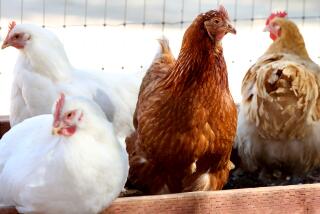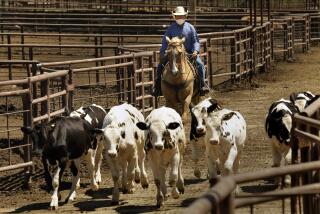How much bacteria would you like with your meat?
I’ve never met anyone who buys organic food to get more vitamins and minerals, so it’s unclear why the public has been treated to a series of studies -- most recently a meta-review out of Stanford University -- telling us that for the most part organics don’t have more vitamins and minerals.
As a Times editorial pointed out last week, consumers buy organic to avoid ingesting common agricultural chemicals and to prevent those chemicals from harming the environment. Pesticide levels in organic food were found to be significantly lower.
But one particular finding in the study carries tremendous importance -- and received almost no attention. Organic chicken and pork were lower in levels of drug-resistant bacteria, though the study’s authors were quick to point out that levels of drug-sensitive E. coli were about the same.
The emergence of more drug-resistant pathogens concerns public health officials mightily, yet the U.S. Food and Drug Administration has been doing very little to stop the routine use of large amounts of antibiotics in livestock operations. Those antibiotics aren’t being used to treat sick animals; they’re used to prevent diseases from sweeping through cramped pens and cages, and to promote growth.
It’s well known that overuse of antibiotics leads to the development of drug-resistant bacteria, and there’s a dearth of new antibiotics to fight those pathogens. Most of the antibiotics in this country are used in agriculture.
Though the study’s authors appear to see it as a positive for conventional products that the levels of nonresistant pathogens were the same, there’s also an important message that the routine use of antibiotics does not lead to lower levels of bacteria. It serves only to raise profits, and to create more resistant bacteria.
This should worry all consumers. Resistant bugs have a way of spreading through the environment.
Of course, animals don’t have to be organically raised -- which means fed an organic diet -- to not be raised on antibiotics. Many conventional meat products come from animals that were not fed antibiotics for growth or disease prevention. As future studies look at differences in the various foods we eat, maybe some of them will make a bigger issue of the bacteria that come with our meat.
ALSO:
Tax planning? Or tax cheating?
The food industry’s big problem with genetically engineered food
More to Read
A cure for the common opinion
Get thought-provoking perspectives with our weekly newsletter.
You may occasionally receive promotional content from the Los Angeles Times.







